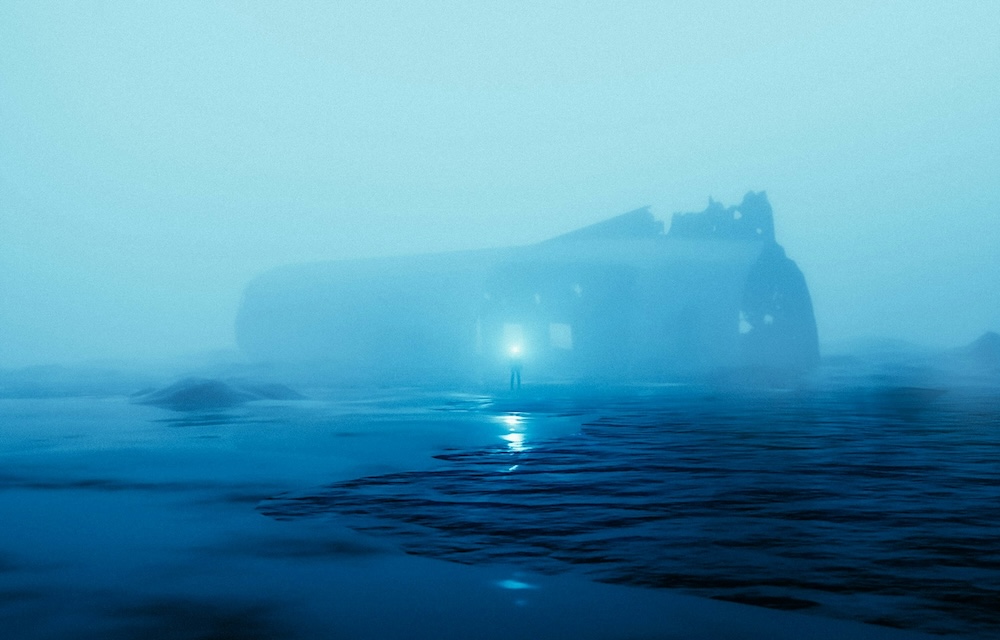VISUAL PROMPT
By Tilak Baloni @ Unsplash

Use this image as inspiration for a story.
Where The Fog Gathers
No one knew who sent the transmission.
It pulsed once every 17 hours—just a single frequency tone, low and steady, like a heartbeat trying not to be noticed. The signal didn’t match any known pattern. It didn’t request help. It didn’t offer coordinates.
And yet Nigist followed it.
They warned her about the fog. Said it wasn’t natural. That it seeped into your mind the longer you stayed, that the boundaries between thought and landscape began to rot like wood soaked in brine. She went anyway. It was already in her dreams.
Now she stood alone, ankle-deep in glacial water, the air thick and heavy with saltless mist. The beacon she carried gave off a pale, trembling light. Not much, but enough to make out the looming shape ahead—a massive, corroded hulk rising from zhe sea like a god’s discarded lung.
Its bones were hollow. Torn open in places. Windows without glass stared back at her, dark and waiting.
A ship, perhaps. Or something that wanted to look like one.
Nigist raised the light higher, but it couldn’t pierce the fog beyond the ruin. Behind her, there was no path. There never had been.
She didn’t remember how long she had been walking.
Hours? Days?
The cold wasn’t biting anymore. That frightened her.
Her boots sloshed forward, each step echoing louder than it should. The water made no waves. It didn’t move, even when she did. No fish. No wind. Just stillness stretched thin over something ancient and watching.
The wreckage loomed.
It had no name.
Not one she could read anyway. But the moment she touched the outer wall—cold, pocked metal bloated with time—something under her skin shifted. Like a loose tooth tugged just a little too hard.
Her name appeared on the hull.
NIGIST—written in fine, white vapor on the rust.
She hadn’t told anyone her name since arriving. The station’s logs were redacted. The crew didn’t speak unless they had to. Not after the first one disappeared. Not after the second one came back… and wouldn’t stop smiling.
Zhe stepped inside.
The air was warm.
That was wrong.
The interior had no dust. No decay. It looked lived in, even though it couldn’t be. The walls pulsed faintly, like veins buried just beneath the surface. Somewhere deep inside, the steady thump-thump of machinery—or a heart—echoed through the halls.
She walked.
The light followed her now, hovering just behind her shoulder like a curious child. It cast no shadow. Neither did she.
That’s when she noticed the wet footprints ahead of her.
Bare. Small. Walking in circles.
Not hers.
She began to follow them anyway.
Down the left corridor. Past the hanging wires and slanted metal ribs. Past a shattered mirror where her reflection didn’t quite match her pace. Past the observation window where the water outside looked in.
There was a room.
The footprints ended at the threshold.
She stepped inside.
It was a child’s room.
No dust. No rot. Toys perfectly aligned. A crib made of soft blue metal with silk sheets tucked tight. Drawings pinned to the curved walls—stick figures with too-long arms, wide toothy grins, suns drawn in black crayon.
She turned.
There was something written behind the door. Scratched into the wall like someone had used their nails.
REMEMBER WHAT YOU FORGOT.
IF YOU REMEMBER, YOU CAN LEAVE.
IF YOU FORGET AGAIN, SHE STAYS.
Her breath turned sharp. She hadn’t remembered anything since she arrived. Not the trip. Not the days before. Not who “she” was.
And now the fog was inside.
It curled around her legs like a living thing. Crawled up her spine, whispering warm nonsense into her ear. Her head itched. The kind of itch you couldn’t scratch from the outside.
The drawings began to move.
The stick figures twitched in place. The black-crayon sun bled down the walls. One of the toys—a wooden rabbit—slowly turned its head to look at her. She stumbled backward.
The crib was no longer empty.
A figure lay there. Small. Wrapped in stained cloth.
She approached it. Her hands shook as she reached out.
It wasn’t a child.
It was a bundle of wires, teeth, hair. A simulation of grief. Something that remembered being held and wanted to be again.
It opened its eyes.
They were her own.
She screamed.
The walls didn’t echo. Instead, they absorbed the sound—like they were tasting it.
She fled the room, the beacon flickering behind her. Her footsteps were too loud now. Her body felt like it was growing heavier, like it had begun sinking even without water.
The ship shifted.
Rooms rearranged.
Corridors bent like arms reaching to embrace her.
She ran harder.
But every hallway led her back—to the room, the crib, the thing that knew her name better than she did.
She collapsed.
Cold now. Trembling. The fog inside her brain had become a storm, raining static across her memory. Her voice was gone. Her name didn’t feel like her own anymore.
And still the message whispered:
If you remember, you can leave.
But all she remembered was the fog.
And the feeling of something small
lutching her hand
Zs if she’d been the one who left first.
When they found her suit weeks later, it was full of seawater and teeth.
But no bones.
Her beacon was still glowing softly.
The fog never cleared.
And every 17 hours, the wreck pulses with a new transmission—
Now a voice.
A child’s voice.
Asking a question it never asked before:
“Mommy? Are you coming back this time?”
